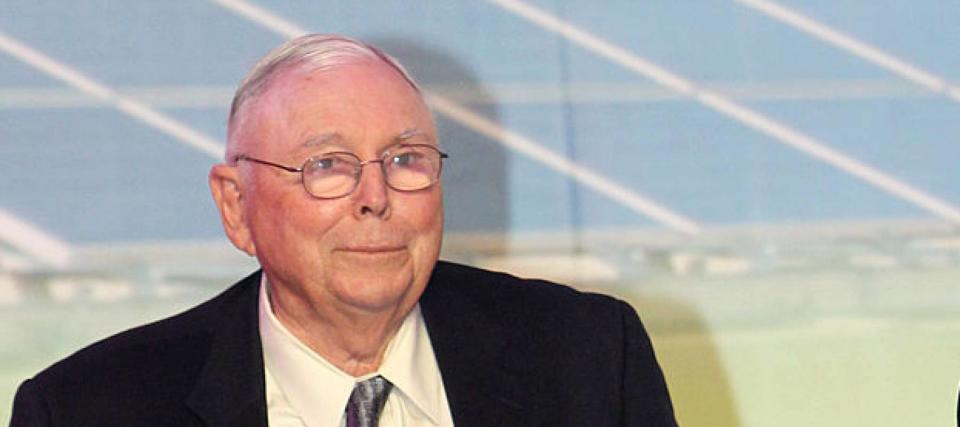If you’ve ever looked at your neighbor’s shiny new car and uttered curses at their good fortune, you’re not alone.
In fact, this feeling of resentment about other people’s financial standing is what makes the world go around, according to the late Charlie Munger.
Don’t miss
“The world is not driven by greed. It’s driven by envy,” said Warren Buffett’s former right-hand man at the Daily Journal ($DJCO) Annual Meeting in 2022.
Munger, who served as Berkshire Hathaway’s vice chairman until he passed away last year at the age of 99, said people too often take what they have “for granted” and they fixate on how seemingly unfair it is that other people have “more” than they do — whether that is more money, more tangible assets or even more friends.
“I have conquered envy in my own life,” he said, while sitting on a multi-billion dollar pile of assets. “I don’t envy anybody. I don’t give a damn what somebody else has. But other people are driven crazy by it.”
To illustrate his point, Munger highlighted the “pretentious expenditures of the rich.”
“Who in the hell needs a real Rolex watch, so you can get mugged for it?” he said — noting that America’s “modern capitalist society” makes people think they need these uber-expensive items to feel like they’ve somehow made it.
“My advice to young people is: don’t go there,” Munger added. “The hell with the pretentious expenditure. I don’t think there’s much happiness in it.”
Interestingly, Jean-Frédéric Dufour, the CEO of the Swiss watch company, recently said people viewing luxury watches as investments “sends the wrong message and is dangerous.”
Here’s how Munger preferred to invest his money.
Attractive valuations and moats
Rather than dropping thousands of dollars on “pretentious expenditures,” Munger preferred to put his money to work by investing — and his efforts resulted in an enviable investment portfolio.
He was a well-known proponent of value investing, which is a strategy that involves buying stocks that are trading below their intrinsic or fair value.
Read more: These 5 magic money moves will boost you up America’s net worth ladder in 2024 — and you can complete each step within minutes. Here’s how
Throughout his long life, Munger advocated for investing in high-quality businesses with strong brands, a competitive advantage, good cash flow, low debt and the ability to raise prices over time. He worked on the assumption that good opportunities were few and far between, and he was willing to pay more for quality.
Munger referred to companies’ competitive advantages as “economic moats.” A term popularized by Buffett, it refers to the unique attributes or “barriers” of a business that protect its market share and profitability as it competes with rivals, such that it will likely generate high returns on capital over the long term.
As Munger put it: “We buy barriers, we don’t build them. Some industries simply don’t have barriers to entry and never will, so we avoid them.”
He said his aim was to “always look for durable competitive advantage” — which he found in companies like See’s Candies, Coca-Cola and later Apple, all of which have made big bucks for the Berkshire Hathaway conglomerate.
Once Munger identified the high-quality businesses he wanted to back, he played the long game and used a buy-and-hold investment strategy to reap the benefits of compound interest and generate attractive returns as the market corrected its pricing inefficiencies.
“All intelligent investing is value investing, acquiring more than you are paying for,” he once said. “You must value the business in order to value the stock.”
As for playing the long game, Munger once said: “The big money is not in the buying or selling, but in the waiting.”
Ultimately, his strategies were very successful. When Munger passed away on Nov. 28, 2023, the nonagenarian had a net worth of around $2.6 billion, according to Forbes — a different level of legacy to a Rolex watch and a nice house.
Invest in yourself
Building an investment portfolio worth billions of dollars will guarantee your financial security and give you the ability to buy what you want, when you want and guilt-free. But it doesn’t necessarily guarantee happiness.
So, what was Munger’s secret to a long and happy life?
In an interview with CNBC’s “Squawk Box” in 2019, he said: “It’s so simple. You don’t have a lot of envy. You don’t have a lot of resentment. You don’t overspend your income. You stay cheerful in spite of your troubles. You deal with reliable people, and you do what you’re supposed to do.”
He added, “All these simple rules work so well to make your life better. And they’re so trite.”
What to read next
This article provides information only and should not be construed as advice. It is provided without warranty of any kind.
Credit: Source link
